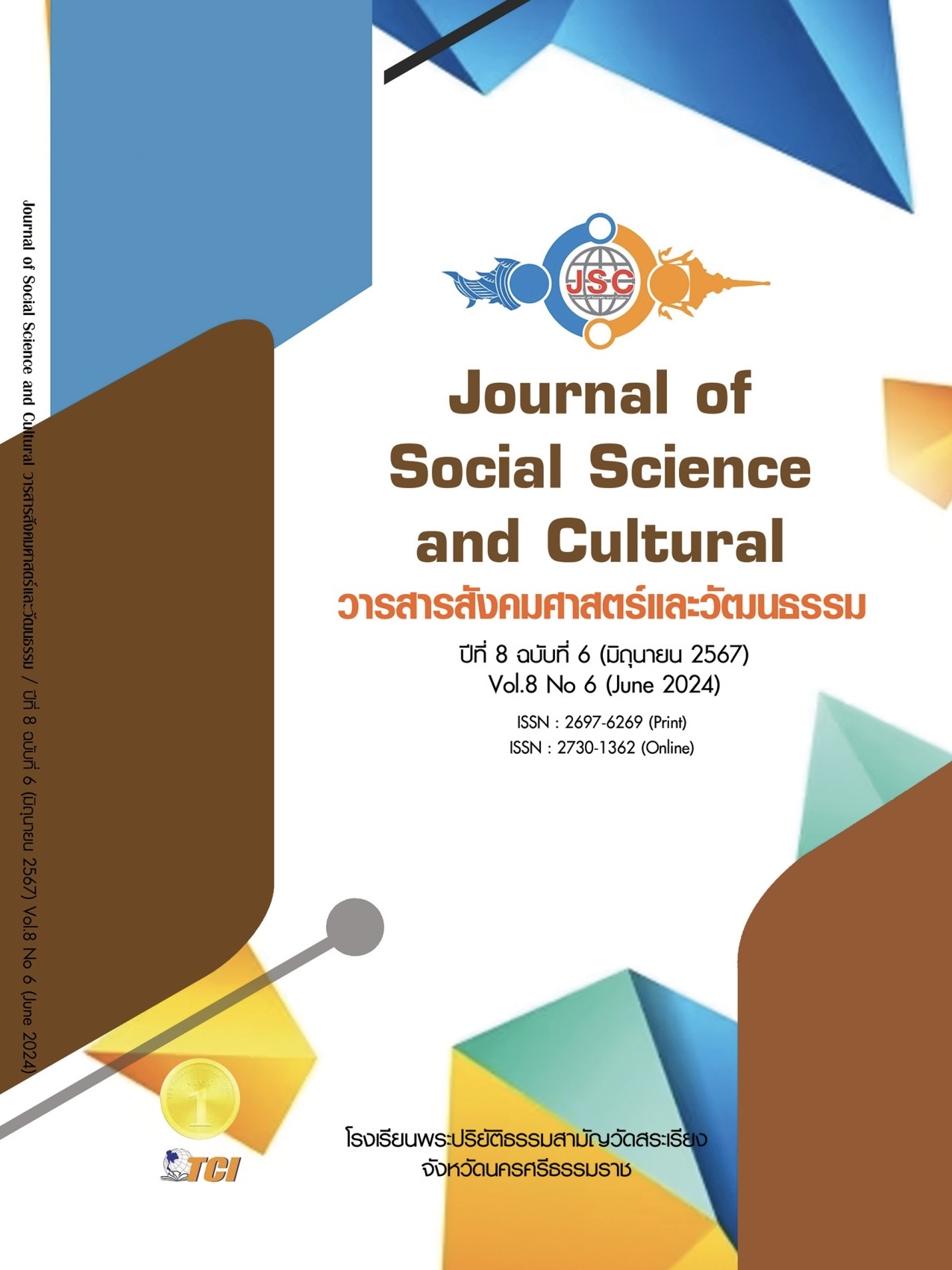MANAGEMENT STRATEGIES OF BANGKOK METROPOLITAN LEARNING CENTERS BASED ON THE CONCEPT OF LIFELONG LEARNING FOR ELDERLY
Main Article Content
Abstract
These objectives of this article were aims to 1) study the conceptual framework for management strategies for community learning centers, 2) study the current condition and desired conditions of management strategies for community learning centers. and 3) develop management strategies for community learning centers of Bangkok according to the concept of lifelong learning of the elderly. Using a multiphase mixed methods research method. Sample groups include: There were 212 elderly people in community learning centers in Bangkok. The tools used were questionnaires, interviews and assessment forms. The Cronbach's alpha coefficient was 0.92, 0.95, respectively. Analyze data for averaging Standard deviation, PNImodified index, and content analysis. Carry out data collection Interview format with in-depth interviews Questionnaires and self-assessments. The results of the research found that 1) The conceptual framework for management strategies of Bangkok Metropolitan community learning centers based on the concept of lifelong learning for the elderly consists of the concepts of community learning center management, quality of life for the elderly, lifelong learning for the elderly, and strategy development. 2) The current conditions and desirable conditions of management strategies for community learning centers in Bangkok were overall at a high level ( = 3.63, S.D. = 0.69), with the elderly's quality of life in terms of health, environment, and social aspects at a high level, while the economic aspect was at a moderate level; and 3) The management strategies for Bangkok Metropolitan community learning centers based on the concept of lifelong learning for the elderly include: 1) Enhancing the quality of life of the elderly to suit their environment, 2) Establishing a network of appropriate occupations for the elderly 3) Organizing enjoyable social activities for the elderly, and 4) Arranging beneficial activities for the elderly
Article Details
References
กรมกิจการผู้สูงอายุ. (2563). แผนปฏิบัติการด้านผู้สูงอายุ ระยะที่ 3 (พ.ศ. 2560-2564). กรุงเทพมหานคร: กรมกิจการผู้สูงอายุ.
จิรศักดิ์ ประทุมรัตน์ และคณะ. (2563). การพัฒนาระบบการจัดการศูนย์การเรียนรู้ชุมชนในสังกัดองค์กรปกครองส่วนท้องถิ่น จังหวัดสมุทรปราการ. วารสารวิทยาลัยดุสิตธานี, 14(3), 491-511.
จุฑามาส โหย่งไทย. (2563). การบริหารจัดการศึกษาสำหรับผู้สูงอายุเทศบาลนคร. ใน ดุษฎีนิพนธ์ปรัชญาดุษฎีบัณฑิต สาขาวิชาบริหารการศึกษา. มหาวิทยาลัยศิลปากร.
ธิติรัตน์ เหล่าพฤฒาจารย์ และจิรัชญา เหล่าพฤฒาจารย์. (2565). การพัฒนาศักยภาพและส่งเสริมอาชีพผู้สูงอายุตามนโยบายองค์การบริหารส่วนจังหวัดชัยภูมิ. วารสาร มจร พุทธปัญญาปริทรรศน์, 7(3), 144-158.
เพชรา บุดสีเทา. (2565). การพัฒนาทักษะอาชีพทางการตลาดผู้สูงอายุ: การเรียนรู้เพื่อส่งเสริมภาวะพฤฒพลัง สำหรับผู้สูงอายุในจังหวัดกำแพงเพชร. วารสารวิชาการตาดและการจัดการ, 9(1), 159-174.
มิ่งขวัญ คงเจริญ และกัมปนาท บริบูรณ์. (2564). การพัฒนารูปแบบโรงเรียนผู้สูงอายุโดยใช้ชุมชนเป็นฐาน. วารสารวิชาการศึกษาศาสตร์, 22(1), 135-149.
เรือนทอง ไวทยะพานิช. (2563). การพัฒนาแผนกลยุทธ์ชุมชนเพื่อส่งเสริมการเรียนรู้ตลอดชีวิตด้านการรู้ดิจิทัลสำหรับผู้ใหญ่. เรียกใช้เมื่อ 10 สิงหาคม 2566 จาก http://digital.car.chula.ac.th/chulaetd/4185
วีนัส ธรรมสาโรรัชต์. (2566). การพัฒนาคุณภาพชีวิตแบบองค์รวมตามหลักภาวนา 4 ของผู้สูงอายุในยุคชีวิตวิถีใหม่. วารสารสหวิทยาการนวัตกรรมปริทรรศน์, 6(3), 77-89.
วีรวัฒน์ เข็มแข็ง และคณะ. (2561). การพัฒนารูปแบบการจัดการความรู้ของกลุ่มผู้สูงอายุเพื่อเสริมสร้างทุนทางปัญญาในการจัดการศึกษาตลอดชีวิต. วารสารศึกษาศาสตร์ปริทัศน์, 33(3), 60-70.
สาธิมาน มากชูชิต และคณะ. (2566). แนวทางการพัฒนาคุณภาพชีวิตผู้สูงอายุในชุมชนเทศบาลนครยะลา โดยใช้ศูนย์การเรียนรู้ชุมชนเป็นฐาน. วารสารมหาราชนครศรีธรรมราชเวชสาร, 7(1), 142-159.
สำนักงานคณะกรรมการสุขภาพแห่งชาติ. (2562). แผนสุขภาพแห่งชาติ ฉบับที่ 12 (พ.ศ. 2560-2564). กรุงเทพมหานคร: สำนักงานคณะกรรมการสุขภาพแห่งชาติ.
สุปราณี พิมพ์ตรา และคณะ. (2561). การเรียนรู้ตลอดชีวิตของผู้สูงอายุในชุมชนหาดวอนนภา ตำบลแสนสุข อำเภอเมือง จังหวัดชลบุรี. วารสารศึกษาศาสตร์, 29(2), 175-187.
อโณทัย ดวงดารา. (2566). แนวทางการบริหารภายใต้หลักธรรมาภิบาลขององค์กรปกครองส่วนท้องถิ่นในประเทศไทย. วารสาร มจร พุทธปัญญาปริทรรศน์, 8(2), 175-184.
อนันต์ อนันตกูล. (2566). สังคมสูงวัย ความท้าทายประเทศไทย. กรุงเทพมหานคร: สำนักธรรมศาสตร์และการเมือง ราชบัณฑิตยสภา.
Cronbach, L. J. (1970). Essentials of psychological testing (3rd ed.). New York: Harper& Row.
Department of Older Persons. (2023). Statistics of elderly population in Bangkok as of December 2022. Bangkok: Ministry of Social Development and Human Security.
Krejcie, R. V., & Morgan, D. W. (1970). Determining sample size for research activities. Educational and Psychological Measurement, 30(3), 607–610.
Thiansawat, S. (2019). Examination of content validity. Retrieved November 10, 2021, from ww.nurse.cmu.ac.th/ web/images/userfiles/files/Research/FacultyResearch Discussion%20-%20content%20validation%20-%20%E0%B8%A1%E0%B8%84% 2062.pdf.
Wongwanit. S. (2007). Needs assessment research. Bangkok: Chulalongkorn University Press.
World Economic Forum. (2020). Schools of the Future: Defining New Models of Education for the Fourth Industrial Revolution. Geneva: World Economic Forum.
World Health Organization. (2021). Age-friendly environments in Thailand: Current situation and future directions. Geneva: World Health Organization.


